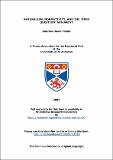Files in this item
Naturalism, normativity, and the 'open question' argument
Item metadata
| dc.contributor.author | Fisher, Andrew David | |
| dc.coverage.spatial | 218 p. | en_US |
| dc.date.accessioned | 2018-04-25T14:01:41Z | |
| dc.date.available | 2018-04-25T14:01:41Z | |
| dc.date.issued | 2003 | |
| dc.identifier.uri | https://hdl.handle.net/10023/13218 | |
| dc.description.abstract | The 'open question' argument, as it has come to be known, was popularized by G. E. Moore. However, it is universally recognized that his presentation of it is unconvincing, as it is based on dubious metaphysics, semantics and epistemology. Yet, philosophers have not confined the argument to the history books, and it continues to influence and shape modern meta-ethics. This thesis asks why this is the case, and whether such an influence is justified. It focuses on three main positions, analytic naturalism, non-analytic naturalism and supernaturalism. It concludes that the 'open question' argument challenges all three. | |
| dc.language.iso | en | en_US |
| dc.publisher | University of St Andrews | |
| dc.subject.lcc | BJ37.F58 | |
| dc.subject.lcsh | Ethics. | en |
| dc.subject.lcsh | Naturalistic fallacy. | en |
| dc.subject.lcsh | Good and evil. | en |
| dc.title | Naturalism, normativity, and the 'open question' argument | en_US |
| dc.type | Thesis | en_US |
| dc.type.qualificationlevel | Doctoral | en_US |
| dc.type.qualificationname | PhD Doctor of Philosophy | en_US |
| dc.publisher.institution | The University of St Andrews | en_US |
This item appears in the following Collection(s)
Items in the St Andrews Research Repository are protected by copyright, with all rights reserved, unless otherwise indicated.

